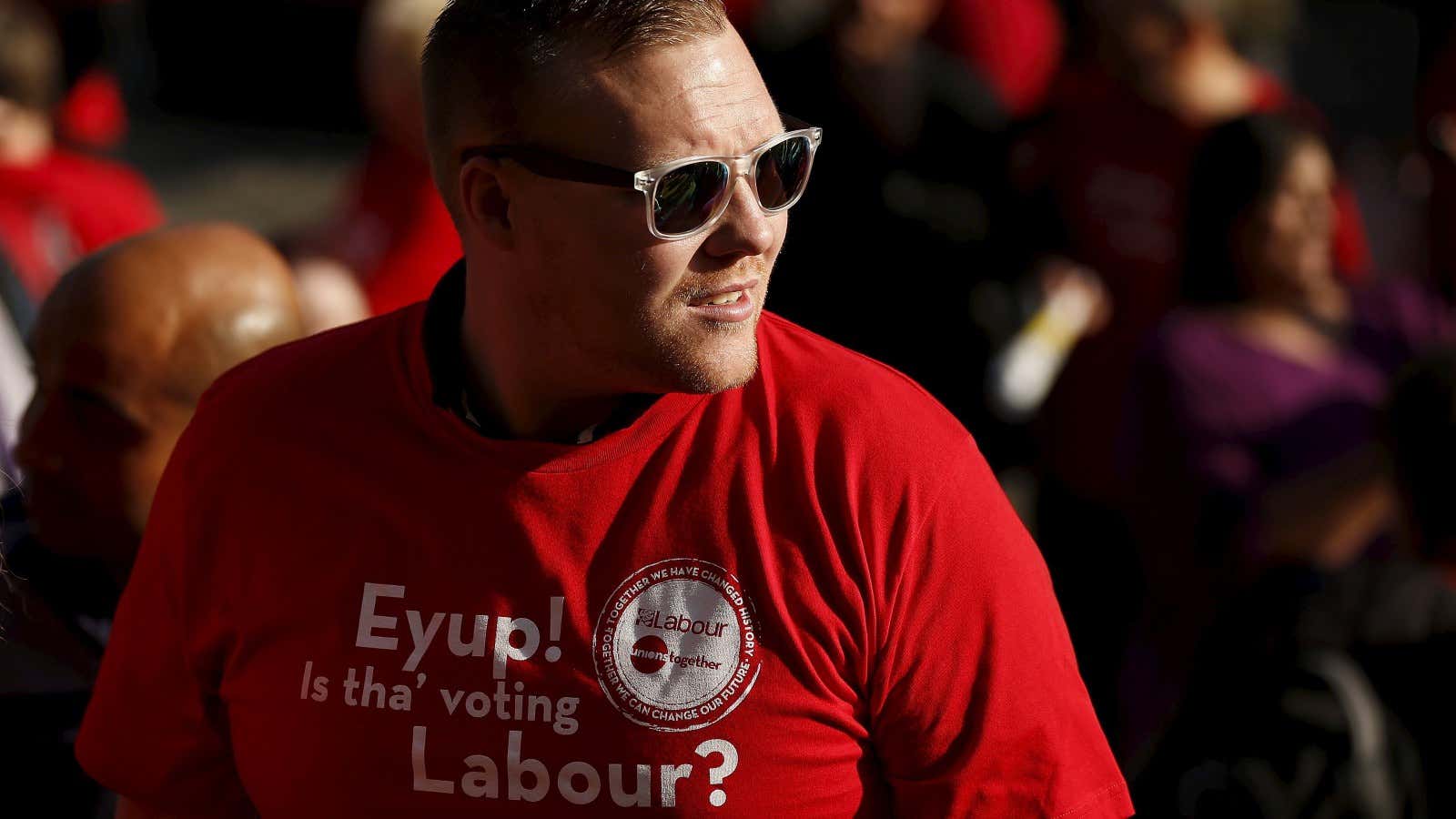The campaign to lead Britain has entered its final week. As leaks turn to torrents and snide remarks to bile, many pollsters say it’s still too close to call. But without guessing the final outcome, there are some things that seem likely: the Scottish National Party will do very well. And the UK Independence Party may collapse almost completely. Here is what caught Quartz’s eye this week on the campaign trail:
Face time
Political leaders appeared on TV one last time, on popular news program Question Time. An increasingly frustrated audience listened as first David Cameron and then Ed Miliband insisted that they were working for an absolute majority and wouldn’t countenance a coalition agreement. Given that the polls show neither winning anything close to 50% of the seats in parliament, that looks impossible.
As Ed Miliband refused to concede the point, one young woman said he and Cameron sounded equally deluded: the party leaders ”seem not to entertain the possibility that you might not get a majority, which is absolutely ridiculous,” she said. “And you really need to be honest with voters about what you might do in the event that you don’t.” She got a round of applause, but no concession.
A leaky ship
The Liberal Democrats are in the strange position of campaigning against a party they have governed with in a formal coalition for five years—and with whom they may well team up again. This week the Lib Dems leaked a Conservative plan to cut child benefit and trim other social programs, which it says it vetoed. The Conservatives called the move “desperate,” according to The Times, which referred to the dispute as “all out war.“
Over there
One of the clearest distinctions to emerge between the parties is around their positions on EU membership—roughly speaking, the more right-leaning the party, the more it wants to take Britain out of the EU. In yesterday’s final TV event, David Cameron once again promised he would make a referendum on membership happen, and Ed Miliband reiterated that he wouldn’t.
A new report by the Bertelsmann Foundation reckons that leaving the EU could cost the British economy hundreds of billions of pounds in lost output, worth as much as 14% of GDP. The Centre for European Reform published a paper that came to a similar conclusion:
The British economy would not collapse if the country were to leave the EU. But the opposite claim—that leaving the EU would be a supply-side liberation for the economy and that the UK would be more open to the world outside the EU than inside—is nonsense.
What’s more, it’s not entirely clear how the main parties’ promise to hold a referendum on EU membership will even work. No country has ever tried, much less suggested, a vote on such a thing.
Boris Watch
The mayor of London and potential future contender for Conservative leader qualified his view of inequality, which he once described as “a valuable spur to economic activity.” In an interview with The Spectator, Johnson said:
I don’t mind people in the sharp end of [a] plane guzzling Château Margaux, if that’s what they want to do. If beloved people that we know want to get on a plane, turn left, ensconce themselves in some ludicrous boudoir where hot towels and free copies of The Spectator are thrust on them every 30 seconds, then let them. It provides jobs.
The problem, he said, comes when those “at the back of the plane” simultaneously find their meals and legroom shrinking.
Mind-bending dataviz of the week
This chart by pollster Ipsos Mori on how thoroughly the electorate has splintered since the last election:
https://twitter.com/IpsosMORI/status/593682469506940929
Odds and ends
Labour won‘t work with the SNP, or maybe it will. David Cameron forgot what football team he “supports”, saying West Ham instead of Aston Villa. In a more Freudian slip of the tongue, he dubbed this a “career defining election.” People born on the day Tony Blair first became prime minister will reach voting age just in time for next week’s election.
Let’s get it on!
